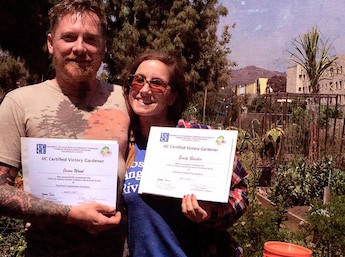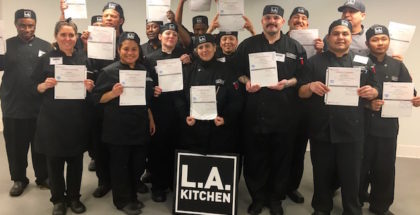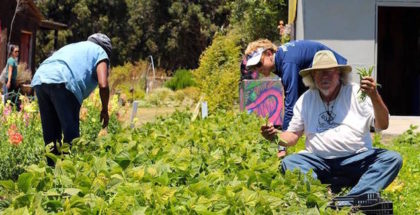Posts By Charli Engelhorn
California Farmers Face Challenges in Wake of Trump Administration Deportation Policy
April 3, 2017 | Charli EngelhornThe 2004 film A Day Without a Mexican presented a scenario in which fresh produce from California’s farms were being sold on the black market and out of car trunks as a consequence of the sudden disappearance of the country’s Mexican population. Although satirical in nature, the message behind the film is becoming more relevant due to recent Trump administration policies regarding immigration and deportation.
According to statistics from the Farm Labor Survey of the USDA’s National Agriculture Statistics Service, in 2012, there were nearly 1.1 million farm workers, on average, working on the 2.1 million farms in the United States. Of those workers, approximately 50 percent were undocumented laborers. This percentage increased when broken down into specific crop production, with undocumented workers accounting for 67 percent of farm workers in the fruit and nut industry and 61 percent in the vegetable industry compared to nine percent and 17 percent, respectively, of farm workers who were U.S. citizens. Read More
In Fight Against Food Poverty, L.A. Kitchen Embraces Imperfect Fruit and Intergenerational Workforce
March 21, 2017 | Charli Engelhorn
Robert Egger, founder and CEO of L.A. Kitchen, a non-profit in Los Angeles that engages, empowers, and nourishes the local community. Photo Courtesy of L.A. Kitchen. Photo Credit: J Wiley Photography.
Fighting hunger is more than just about food for Robert Egger, founder and CEO of L.A. Kitchen, a non-profit in Los Angeles that engages, empowers, and nourishes the local community “by reclaiming healthy, local food that would otherwise be discarded, training men and women who are unemployed for jobs, and providing healthy meals to fellow citizens,” according to the organizations mission statement.
“Fighting hunger is a political act, a social act, an economic act,” says Egger. “I want to be a source and develop a model that shows how you can feed more people a better meal with less money.”
L.A. Kitchen is modeled after Egger’s first enterprise, D.C. Central Kitchen in Washington D.C. A chance experience of accompanying friends to feed the homeless there highlighted some inadequacies Egger couldn’t ignore, such as purchasing the food when so many people in the food industry he knew lamented over wasting food at the end of the night. Read More
SoCal Urban Farming Org Increases Supply of Fresh Produce to Homeless Shelter by Healing Soil and Residents
January 24, 2017 | Charli Engelhorn
Velva, an employee of GrowGood, a CA-based nonprofit that has been working with the Salvation Army since 2011 to develop a garden-based program for the residents of the Bell Shelter that uses healthy food and gardening as a catalyst for healing. (Photo courtesy of GrowGood. Photo credit: Amy Gordon.)
Prior to the establishment of the GrowGood urban farm on a lot across the way from the Salvation Army Bell Shelter located in Bell, CA, the shelter, which serves nearly 6,000 meals per week, incorporated very little fresh produce into its menu.
“They were spending cents per meal on fresh produce. Food was donated, so no one was going hungry; but the nutritional quality was often low,” says Brad Pregerson, co-founder of GrowGood, a CA-based nonprofit that has been working with the shelter since 2011 to develop a garden-based program to not only increase the supply of fresh produce to the shelter, but also to provide its residents with meaningful work and act as catalyst for healing.
The Salvation Army Bell Shelter, which opened in 1988, was established with help from Pregerson’s grandfather, Harry, a federal judge and veteran, who perceived the dire need to provide housing for the growing Read More
For Homeless in Santa Cruz, CA, Garden Project Offers Hope, Stability, and Jobs
December 26, 2016 | Charli EngelhornTalking about the homeless population of America is popular these days. And yet fixing the situation seems, to many, an impossibly overwhelming task. Others are proving it’s not. The Santa Cruz Homeless Garden Project (HGP) uses sustainable agriculture as the springboard to a safer, productive and more hopeful life for many. The agriculture and gardening training provided to the homeless of Santa Cruz County through the project has culminated in both jobs and permanent housing for its trainees.
“We find people that express much greater degrees of well being after they are with us for a year, whether it’s in their diet, in their sense of self, in their ability to set goals and achieve them, in how connected they feel to the community,” says Darrie Ganzhorn Executive Director of the Homeless Garden Project. Read More
Master Gardener Program Grows Food and Community Across L.A. County
December 12, 2016 | Charli EngelhornSince University of California Cooperative Extension established the first Master Gardener Programs in the state in 1981, its army of certified volunteer gardeners, who are today spread across more than 50 counties, have supported programs aimed at educating California residents, especially those living in low-income communities, about growing their own food.
In Los Angeles, one such program that Master Gardener Program volunteers supported was the Common Ground Garden Program, which was established in 1976 with funds from a Congressional appropriations bill to support a national Urban Garden Program. Working in collaboration with the Common Ground Garden Program, the Master Gardener volunteers played a pivotal role in helping to set up several community and school gardens across the county.
After funding from the Urban Garden Program ceased, the Los Angeles County branch of the Master Gardener Program formally took over the task of training community gardeners. Read More
Urban Agriculture Incentive Program Seeks to Increase Farming Opportunities in Local Communities
December 5, 2016 | Charli EngelhornIn September 2013, California passed Assembly Bill 551 (AB551), Urban Agriculture Incentive Zones (UAIZ), which allows cities and counties within the state to incentivize land owners to donate vacant or undeveloped land for urban agriculture use over a five-year period, according to information from the Los Angeles Department of Regional Planning. Land owners who participate will receive reduced property tax assessments in exchange for this allowance.
The requirements to participate include parcels between 0.10 and 3 acres, a minimum contract of five years, complete use of the land for agriculture purposes, and no prior physical structures existing on the property. Many California communities have already passed or are in the process of approving the ordinance including San Francisco, San Diego, Long Beach, San Jose, and Sacramento; however, only a couple of contracts have been processed in those areas combined.
The ordinance has already passed through Los Angeles County, but this motion only applies to unincorporated areas. The incorporated city of Los Angeles is currently in the process of approving the ordinance, according to Iesha Siler, a policy associate for the Los Angeles Food Policy Council (LAFPC). Read More
From Lima Beans to City Hall: A Los Angeles Couple Brings Food and Beauty to Local Neighborhoods
November 21, 2016 | Charli Engelhorn
Jason Wood and Emily Gleicher run Farm LA, a Los Angeles-based non-profit that converts underutilized parcels of land into vibrant urban farms. Photo credit: Dan Fujiwara.
A mutual passion for gardening and supporting underserved communities were the motivations behind the conception of Farm LA, a Los Angeles-based non-profit organization geared toward converting dilapidated and underutilized parcels of land for urban farming.
Emily Gleicher, a freelance producer for design and animation projects, and Jason Wood, a former commercial diver who now works as an electrician and framer in construction, founded Farm LA after a non-traditional gift sparked their interests.
“For Valentine’s Day, Jay found these lima bean plants at CVS that sprout out and say ‘I Love You,’” says Gleicher. “We had already become very passionate about gardening… so the lima beans took off, and we all of a sudden had lima bean plants all over our house. That is where our love for gardening and lima beans started.”Soon after, the young couple started looking at properties around Los Angeles for fun in the event they decided to build a small house somewhere. Read More











